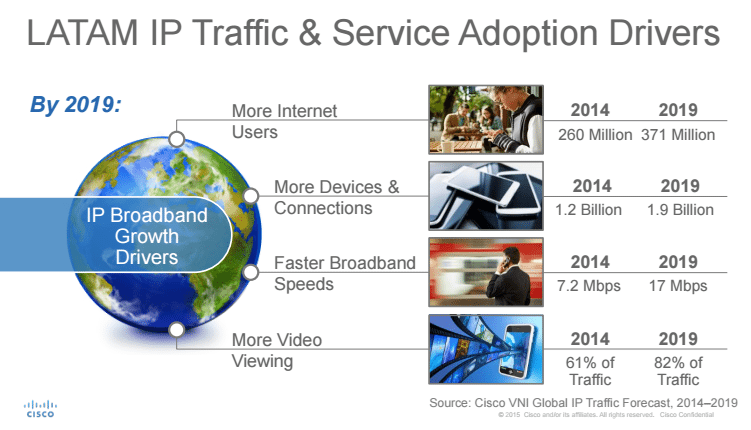Internet Protocol traffic in Latin America will triple from 2014 to 2019, reaching 12.9 exabytes per month in 2019, up from 4.3 exabytes per month in 2014. This dramatic growth will be driven by the growth of IP video, along with increases in the number of Internet users, smartphone penetration and machine-to-machine connections.
Brazil accounts for the largest share of IP traffic in the region. In 2019, Brazil will represent 34% of the total traffic, followed by Mexico at 24%, according to the 10th annual Cisco Visual Networking Index, which was presented at a press conference on May 27 in São Paulo.
The index predicts that video will make up 82% of all IP traffic in 2019, up from 61% in 2014. Total IP video traffic will reach 10.5 exabytes per month in 2019, a fourfold growth from 2014. Hugo Baeta Santos, Cisco’s director for operators, said that video is the application which consumes a high amount of data traffic and its adoption is rising. “As Internet access gets faster, more and more people will consume video,” he said.
 Santos said that carriers and Internet service providers are betting on content delivery networks to support the growing demand for online video. According to VNI, 35% of all Internet traffic and 40% of all Internet video traffic will cross CDNs in 2019, up from 17% in 2014.
Santos said that carriers and Internet service providers are betting on content delivery networks to support the growing demand for online video. According to VNI, 35% of all Internet traffic and 40% of all Internet video traffic will cross CDNs in 2019, up from 17% in 2014.
Cisco’s VNI also predicts that mobile data traffic will grow three times faster than fixed IP traffic in Latin America from 2014 to 2019, reaching 2 exabytes per month in 2019. Mobile represented 5% of total IP traffic in Latin America in 2014 and will grow to 16% of total IP traffic in 2019.
Globally, the survey showed that annual IP traffic will triple between 2014 and 2019, when it will reach a record 2 zettabytes.
Satellite auction in Brazil: Three companies won Brazil’s new satellite signal auction. Telesat was awarded two locations. Hispamar and Star Satellite Communications received one each. In total, Brazil collected about U.S.$60 million (R$183.7 million), 69.6% above the established reserve price. President of regulator Anatel João Rezende said that the auction’s results show that investors believe in the potential of Brazil’s telecommunications market.
More news from the Latin American region:
CHILE – The country’s senate passed a project aimed at creating a minimum standard for telecom operators and ISPs for providing Internet access. The document proposes that fixed connection providers guarantee 60% of the speed of access offered for domestic connections and 40% for international. For mobile connections, providers need to ensure 50% for domestic and 30% for international.
BRAZIL – Oi invested $10.18 million in the first quarter of 2015 to expand its network in the north of the country. The investment includes a project named Projeto Linhão that is expected to conclude its first phase by the end of the first half of 2015.
Wondering what’s going on in Latin America? Why don’t you follow me on Twitter? Also check out all of RCR Wireless News’ Latin American content.

